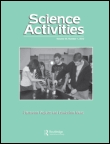
Science Activities-Projects and Curriculum Ideas in STEM Classrooms
Scope & Guideline
Revolutionizing Learning: Practical Ideas for STEM Classrooms
Introduction
Aims and Scopes
- Integration of STEM Disciplines:
The journal emphasizes the importance of integrating various STEM disciplines—science, technology, engineering, and mathematics—into cohesive learning experiences that promote interdisciplinary understanding. - Hands-on Learning Activities:
It promotes hands-on, inquiry-based learning activities that encourage students to actively engage with scientific concepts through experimentation and problem-solving. - Sustainability and Environmental Education:
A significant focus on sustainability and environmental education is evident, with numerous publications addressing climate change, biodiversity, and sustainable practices within the context of STEM. - Culturally Relevant Pedagogy:
The journal supports culturally relevant teaching practices, showcasing activities that incorporate local culture and community issues, thereby making STEM education more relevant to diverse student populations. - Innovative Teaching Methodologies:
It explores various innovative teaching methodologies, including project-based learning, gamification, and the use of technology, to enhance the educational experience and outcomes in STEM subjects.
Trending and Emerging
- Computational Thinking and Digital Tools:
There is a growing emphasis on integrating computational thinking and digital tools into STEM education, reflecting the importance of technology in modern learning environments. - Sustainability and Climate Change Education:
Recent publications show a heightened focus on sustainability and climate change education, as educators seek to empower students to address pressing global challenges through STEM. - Social Justice and Socioscientific Issues:
The incorporation of social justice themes and socioscientific issues into STEM education has gained traction, promoting critical thinking about real-world problems and ethical implications. - Gamification and Interactive Learning:
The use of gamification and interactive learning strategies is on the rise, as educators explore innovative ways to engage students and enhance motivation in STEM subjects. - Culturally Responsive Teaching:
There is an increasing trend towards culturally responsive teaching practices, with activities designed to reflect and respect the cultural backgrounds of students, making learning more inclusive and relevant.
Declining or Waning
- Basic Science Concepts:
There is a noticeable decrease in publications dedicated to basic science concepts, such as simple experiments and foundational knowledge, as the focus shifts towards more complex, interdisciplinary approaches. - Traditional Assessment Methods:
Traditional assessment techniques, such as standardized testing and rote memorization, seem to be waning, as the journal increasingly emphasizes formative assessment and student-centered evaluation strategies. - Isolated Subject Teaching:
The trend towards isolated subject teaching appears to be declining, with fewer articles promoting standalone science or math lessons, indicating a shift towards integrated STEM curricula. - Focus on Higher Education:
There seems to be a reduction in content aimed specifically at higher education levels, as the journal increasingly targets K-12 educators and practices, reflecting a broader commitment to early STEM education. - Static Learning Environments:
The journal has moved away from discussing static or traditional classroom environments, focusing instead on dynamic, interactive learning spaces that promote collaboration and engagement.
Similar Journals

Recherche et Pratiques Pedagogiques en Langues de Specialite-Cahiers de l Apliut
Connecting Educators and Researchers in Language Innovation.Welcome to Recherche et Pratiques Pedagogiques en Langues de Specialite-Cahiers de l Apliut, a distinguished journal published by the ASSOC PROFESSEURS LANGUES IUT-APLIUT in France. Focused on the critical intersection of education and linguistics, this journal aims to disseminate innovative research and practices in the field of specialized languages and pedagogy. With its ISSN 2257-5405 and E-ISSN 2119-5242, it serves as a vital platform for educators, researchers, and students to explore effective teaching methodologies and language acquisition strategies. The journal has garnered recognition in various categories, currently ranked Q4 in Education and Q3 in Linguistics and Language for 2023, highlighting its emerging contribution to the field. Although it operates without an open access option, its focused studies and implications for educational practices ensure that critical insights are accessible to professionals seeking to enhance their understanding and application of language education. Join a community committed to advancing pedagogical approaches in specialized languages through the insights provided in this journal, bridging theoretical frameworks and practical applications from 2011 to 2019 and continuing from 2021 to 2024.
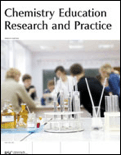
Chemistry Education Research and Practice
Advancing Pedagogy for a Brighter Chemistry FutureChemistry Education Research and Practice is a prominent journal dedicated to advancing the field of chemistry education through rigorous research and innovative practices. Published by the Royal Society of Chemistry, this journal, with an ISSN of 1109-4028 and an E-ISSN of 1756-1108, operates out of Greece and has established itself as a leading voice in the intersection of chemistry and educational methodology. With a remarkable impact factor and ranking in the top quartiles (Q1) for both Chemistry and Education in 2023, it appeals to a diverse audience of researchers, educators, and practitioners who are passionate about enhancing chemistry instruction and learning experiences. The journal spans a wide range of topics, aiming to promote and disseminate high-quality research that informs pedagogical strategies, curriculum development, and educational policy. By providing a platform for vibrant discussions and new ideas, Chemistry Education Research and Practice plays a crucial role in shaping the future of chemistry education worldwide and continues to impact the academic community significantly.
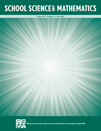
School Science and Mathematics
Transforming the future of science and mathematics education, one article at a time.School Science and Mathematics is a prestigious academic journal published by WILEY, focusing on the intersection of education, mathematics, and the sciences. With an ISSN of 0036-6803 and an E-ISSN of 1949-8594, this journal has been a vital resource for educators, researchers, and practitioners since its inception. Indexed in top-tier databases, it boasts impressive Scopus rankings with a Q1 classification in History and Philosophy of Science and a consistent Q2 positions in Education and Engineering, showcasing its impact within the academic community. The journal aims to enhance the teaching and learning of science and mathematics by publishing high-quality, peer-reviewed research that informs best practices and innovative approaches in education. Operating from the United States, it attracts contributions that influence educational strategies and curriculum development across varied disciplines, making it an essential venue for those engaged in advancing knowledge within these fields. Access to its insightful articles can enrich your understanding and drive dialogue among scholars dedicated to improving science and mathematics education.

EDUCATIONAL LEADERSHIP
Empowering Innovators in Educational LeadershipEDUCATIONAL LEADERSHIP, published by the Association for Supervision and Curriculum Development, is a pivotal journal in the field of education, focusing on innovative practices and theories that shape educational leadership today. Established in 1976, this journal addresses critical issues surrounding curriculum development, supervision, and effective leadership strategies within educational institutions. Although it currently does not offer open access, it remains an essential resource for researchers, educators, and administrators seeking to enhance their understanding of educational dynamics and improve school effectiveness. The journal's impact is underscored by its Scopus ranking, placing it 1017 out of 1319 in the Social Sciences Education category. The absence of a current HIndex in the data indicates an opportunity for further citation engagement and scholarly recognition. Additionally, while coverage in Scopus has been discontinued as of 2019, the legacy of EDUCATIONAL LEADERSHIP continues to influence educational practices worldwide, making it an invaluable asset for those dedicated to advancing the field of education.
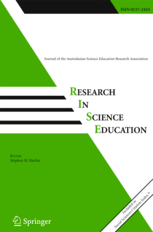
RESEARCH IN SCIENCE EDUCATION
Exploring New Horizons in Science Teaching and LearningRESEARCH IN SCIENCE EDUCATION is a premier journal published by Springer, esteemed in the field of education, particularly focused on science education research. With an ISSN of 0157-244X and an E-ISSN of 1573-1898, the journal enjoys an exceptional standing, reflected in its Q1 category ranking within Education for 2023 and a notable Scopus rank of #165 out of 1543 in the Social Sciences and Education domain, placing it in the 89th percentile. This commitment to quality and impact underscores the journal's role in disseminating cutting-edge research, innovative teaching strategies, and effective learning practices that shape the future of science education. Researchers, educators, and students will find invaluable insights and a wide range of topics that cater to their interests in advancing the pedagogy and practice of science teaching and learning. Published in the Netherlands, RESEARCH IN SCIENCE EDUCATION provides a vital platform for those seeking to contribute to and engage with the evolving landscape of science education.
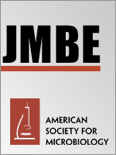
Journal of Microbiology & Biology Education
Fostering Innovation in Biological Sciences EducationJournal of Microbiology & Biology Education, published by the American Society for Microbiology, serves as a vital platform for advancing knowledge and education in microbiology and related biological fields. With an ISSN of 1935-7877 and an E-ISSN of 1935-7885, this open-access journal has been fostering scholarly communication since 2000, ensuring that vital research is accessible to a global audience. The journal covers a broad scope within the disciplines of Agricultural and Biological Sciences, Biochemistry, Genetics, Molecular Biology, and Educational methodologies, holding a significant position as reflected by its Q2 quartile rankings in multiple fields for 2023. The Scopus ranking highlights its relevance, ranking it in the 64th percentile in general Agricultural and Biological Sciences and Education, and 48th in Immunology and Microbiology. Positioned in the United States, the journal addresses the imperative need for educational resources and research dissemination in the ever-evolving landscape of microbiological sciences. Researchers, professionals, and students will find invaluable insights and pedagogical innovations within its pages, advancing both academic inquiry and educational practice.
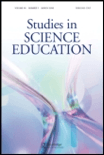
Studies in Science Education
Exploring Innovations in Science EducationStudies in Science Education is a prestigious journal published by ROUTLEDGE JOURNALS, TAYLOR & FRANCIS LTD, renowned for its commitment to advancing the field of science education. With an impressive impact factor, and categorized in the Q1 quartile within the Education domain, this journal ranks among the top in the field, currently holding the 16th position out of 1543 social science education journals, placing it in the 98th percentile according to Scopus rankings. Since its inception in 1974, it has provided a rigorous platform for researchers, practitioners, and educators to explore, debate, and disseminate significant findings relevant to science education. Although the journal does not offer open access options, it ensures high visibility through its well-curated content, including empirical studies, theoretical discussions, and innovative practices aimed at enhancing educational outcomes in science. By continuously engaging with contemporary educational challenges, Studies in Science Education serves as an essential resource for those dedicated to improving science teaching and learning worldwide.
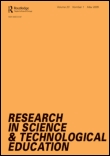
Research in Science & Technological Education
Advancing the Future of STEM EducationResearch in Science & Technological Education, published by Routledge Journals, Taylor & Francis Ltd, is a leading international journal dedicated to advancing the field of education within the realms of science and technology. With its ISSN 0263-5143 and E-ISSN 1470-1138, this prestigious journal provides a platform for innovative and rigorous research from 1983 to the present, thus offering critical insights into pedagogical practices, curriculum development, and policy-making. Boasting a remarkable impact, it ranks in the top quartile (Q1) in both Education and Multidisciplinary categories as of 2023, with an impressive Scopus ranking of #270 out of 1543 in Social Sciences _ Education, placing it in the 82nd percentile. Researchers, educators, and students will find invaluable resources and discussions that shape the future of science and technological education in an increasingly complex world. Although this journal does not offer Open Access, it maintains a strong commitment to disseminating high-quality research, making it an essential read for those invested in the evolution of educational practices and outcomes in the STEM fields.
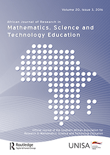
African Journal of Research in Mathematics Science and Technology Education
Fostering Innovation in African Science EducationAfrican Journal of Research in Mathematics Science and Technology Education is a distinguished academic journal, published by Routledge Journals, Taylor & Francis Ltd, dedicated to advancing knowledge in the fields of mathematics, science, and technology education within the African context. With an ISSN of 1811-7295 and an E-ISSN of 2469-7656, this journal has been a crucial platform for scholarly discourse since its inception in 1997, steadily gaining reputation and impact among researchers, educators, and policymakers. The journal features a rigorous peer-review process, ensuring that high-quality research garners visibility across various disciplines, as evidenced by its Quartile rankings in Computer Science Applications, Education, Engineering, Mathematics, and Physics and Astronomy. With its commitment to serving the educational community and fostering innovative practices, the African Journal of Research in Mathematics Science and Technology Education plays a pivotal role in shaping the future of STEM education in Africa and beyond.

Revista Eureka sobre Ensenanza y Divulgacion de las Ciencias
Enhancing Understanding Through Open Access KnowledgeRevista Eureka sobre Ensenanza y Divulgacion de las Ciencias is a premier open-access journal dedicated to advancing the fields of education and science communication. Published by the University of Cadiz in Spain, this journal has established itself as a vital platform since its inception in 2004. With an ISSN of 1697-011X, it aims to disseminate innovative research and pedagogical strategies that enhance the understanding and teaching of scientific disciplines. As of 2023, it holds a Q3 categorization in Education with a Scopus rank of #989/1543, reflecting its commitment to academic excellence and relevance. The journal's open-access model ensures that valuable research is readily available to educators and researchers worldwide, fostering a community engaged in the promotion of effective science education. With a focus on bridging theoretical and practical applications, Revista Eureka invites contributions that spark dialogue and inspire new methodologies in science teaching and dissemination.